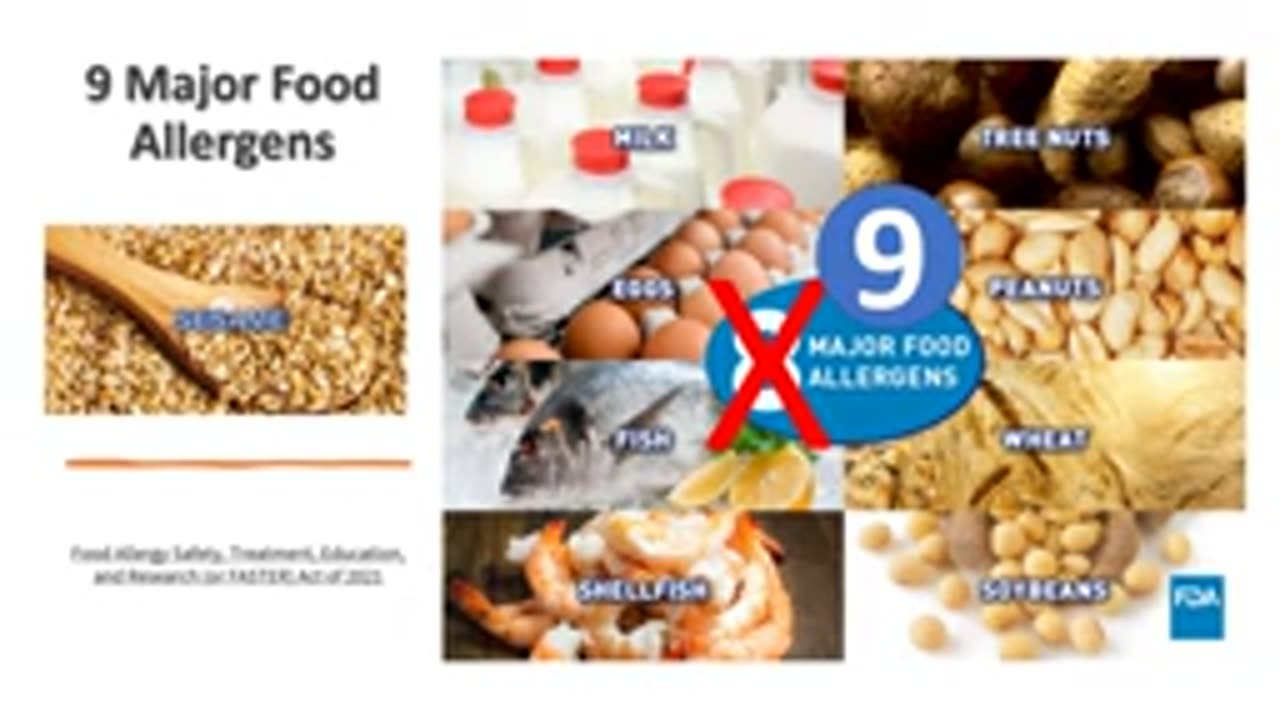Premium Only Content

The 9th big allergen- Sesame │ The Big 9 Major Allergens in the US │ Food Safety
In the United States, **sesame** has been officially recognized as the **9th major allergen** under the Food Allergy Safety, Treatment, Education, and Research (FASTER) Act of 2021. This brings sesame into the list of the **Big 9 Major Allergens**, which now includes:
1. Milk
2. Eggs
3. Fish
4. Crustacean shellfish
5. Tree nuts
6. Peanuts
7. Wheat
8. Soybeans
9. **Sesame**
---
### **Why Was Sesame Added?**
- **Prevalence of Sesame Allergy:** Sesame allergies affect approximately 0.1% of the U.S. population but can cause severe allergic reactions, including anaphylaxis.
- **Hidden Sources of Sesame:** Sesame is often used in foods in forms that are difficult to recognize, such as oils, pastes, or flavorings. The labeling requirement helps consumers avoid accidental exposure.
---
### **Labeling Requirements for Sesame**
As of **January 1, 2023**, the FASTER Act mandates that food manufacturers must:
1. Clearly label sesame as an allergen on packaged food products.
- Example: "Contains: Sesame."
2. Include sesame in the list of ingredients when used, even in trace amounts.
3. Avoid using ambiguous terms like "spices" or "natural flavorings" if they include sesame.
---
### **Common Foods Containing Sesame**
- **Seeds & Oils:** Sesame seeds (white, black, or hulled) and sesame oil.
- **Baked Goods:** Bagels, bread, crackers, and hamburger buns.
- **Condiments:** Tahini (sesame paste), hummus, and salad dressings.
- **Cuisines:** Asian (e.g., sesame chicken), Middle Eastern, and Indian dishes.
---
### **Food Safety Best Practices for Sesame Allergies**
1. **Avoid Cross-Contact:**
- Use separate utensils and surfaces when preparing allergen-free meals.
- Clean and sanitize all equipment thoroughly.
2. **Educate Staff:**
- Train food handlers about sesame as a major allergen.
- Emphasize checking ingredient labels for hidden sources of sesame.
3. **Communicate with Consumers:**
- Clearly label menus or provide allergen information upon request.
- Inform customers of any risk of cross-contact.
4. **Emergency Preparedness:**
- Ensure staff knows how to respond to allergic reactions, including the use of epinephrine auto-injectors.
---
### **Impact on Food Industry**
- Increased attention to labeling and allergen control processes.
- Manufacturers and food establishments must comply with new regulations to avoid penalties and ensure customer safety.
The addition of sesame to the Big 9 highlights the growing awareness of food allergies and the importance of transparency in food labeling for consumer protection.
-
 6:54
6:54
HSESafetyInformation
5 months ago6 Must Try Breakfast recipes By Food Fusion
351 -
 2:00:46
2:00:46
The Quartering
2 hours agoClintons To Testify, Zoo Asks For Peoples Pets For Food, Young Voters, GTA To Require ID To Play
66.9K13 -
 LIVE
LIVE
Barry Cunningham
4 hours agoREACTING TO THE PRESIDENT TRUMP INTERVIEW ON CNBC! (THE CONTRAST OF COMMUNISM AND MORE NEWS))
3,516 watching -
 LIVE
LIVE
StoneMountain64
2 hours agoBATTLEFIELD 6 BETA Training and Prepping
229 watching -
 1:15:15
1:15:15
Awaken With JP
2 hours agoArrest Warrants for Dems, MSNBC Sucks, and More - LIES Ep 103
12.8K10 -
 LIVE
LIVE
The HotSeat
16 minutes agoIf I Were The Devil: Part I
325 watching -
 LIVE
LIVE
The Tom Renz Show
48 minutes agoBurn Bags - Epstein Story is Back On Top (No Pun Intended)
66 watching -
![[Ep 721] DOJ: Grand Jury on Russiagate | Rogue TX Dems - FAFO | Sam Anthony – [your]NEWS](https://1a-1791.com/video/fww1/39/s8/1/u/i/K/8/uiK8y.0kob.1-small-Ep-721-DOJ-Grand-Jury-on-Ru.jpg) LIVE
LIVE
The Nunn Report - w/ Dan Nunn
1 hour ago[Ep 721] DOJ: Grand Jury on Russiagate | Rogue TX Dems - FAFO | Sam Anthony – [your]NEWS
63 watching -
 1:58:54
1:58:54
The Charlie Kirk Show
4 hours agoThe Obamagate Grand Jury + The Mamdani/Warren Alliance | Prof. Steele, Brand | 8.5.2025
53.4K27 -
 1:20:03
1:20:03
Sean Unpaved
3 hours agoNFL Coaching Edge: Top Staffs, Rookie Head Coaches, & NFC South Breakdown
23.5K